Analyzing Communication Systems in Domiciliary Adult Care: A Report
VerifiedAdded on 2023/01/09
|8
|2549
|100
Report
AI Summary
This report delves into the critical role of effective communication within a domiciliary adult care setting. It addresses the diverse communication needs of individuals in the care provider's role, highlighting the importance of adapting strategies to meet those needs, including the use of verbal, non-verbal, and assistive communication methods. The report analyzes existing communication systems and practices, evaluating their effectiveness and suggesting improvements such as incorporating the 7Cs of communication and leveraging technology. It further examines the effectiveness of different communication systems for partnership working, emphasizing the significance of clear communication tools and training programs. The report also discusses the legal and ethical considerations surrounding confidentiality and information sharing, emphasizing the need for informed consent and adherence to data protection regulations. The conclusion underscores the importance of continuous evaluation and improvement of communication strategies to enhance the quality of care provided.
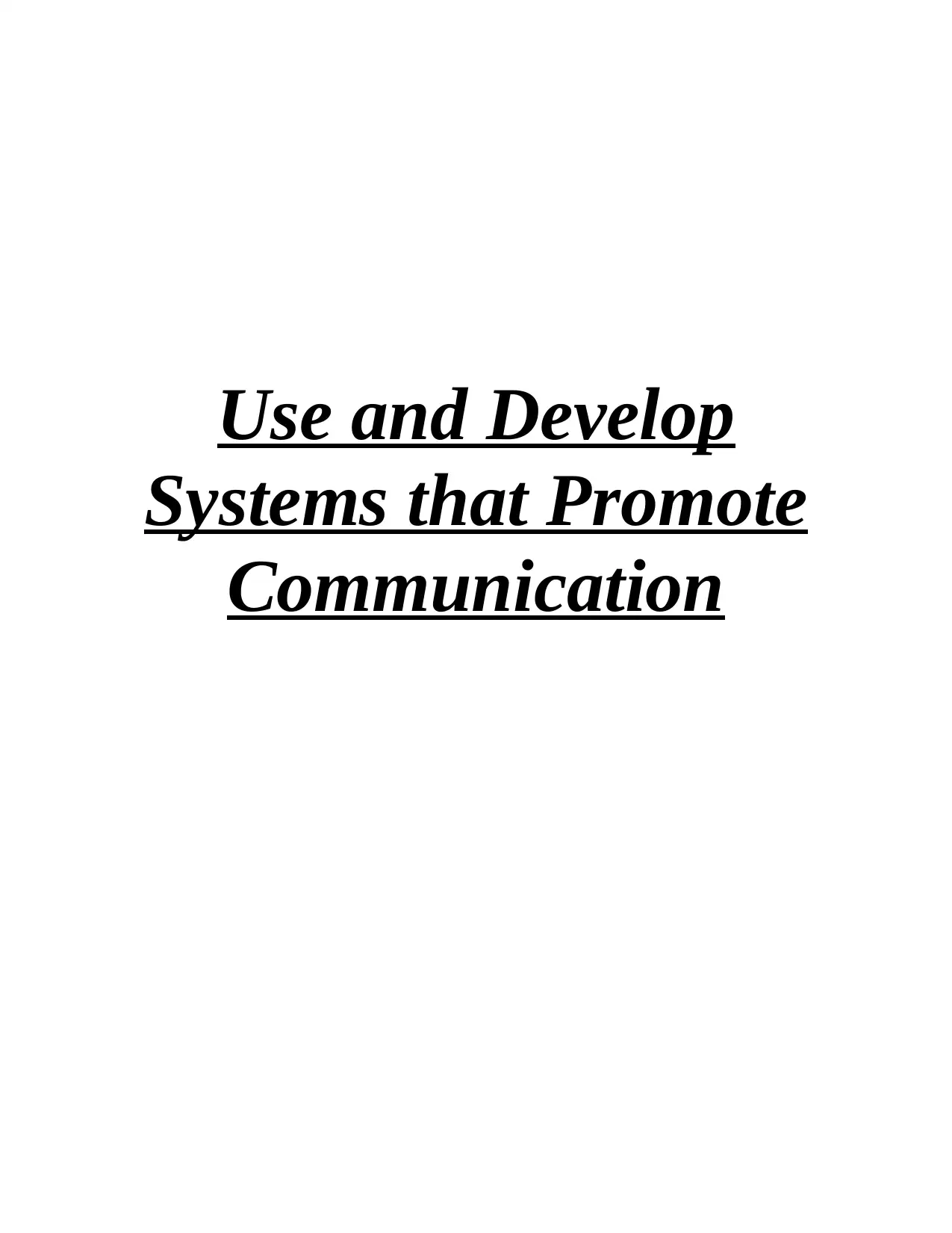
Use and Develop
Systems that Promote
Communication
Systems that Promote
Communication
Paraphrase This Document
Need a fresh take? Get an instant paraphrase of this document with our AI Paraphraser
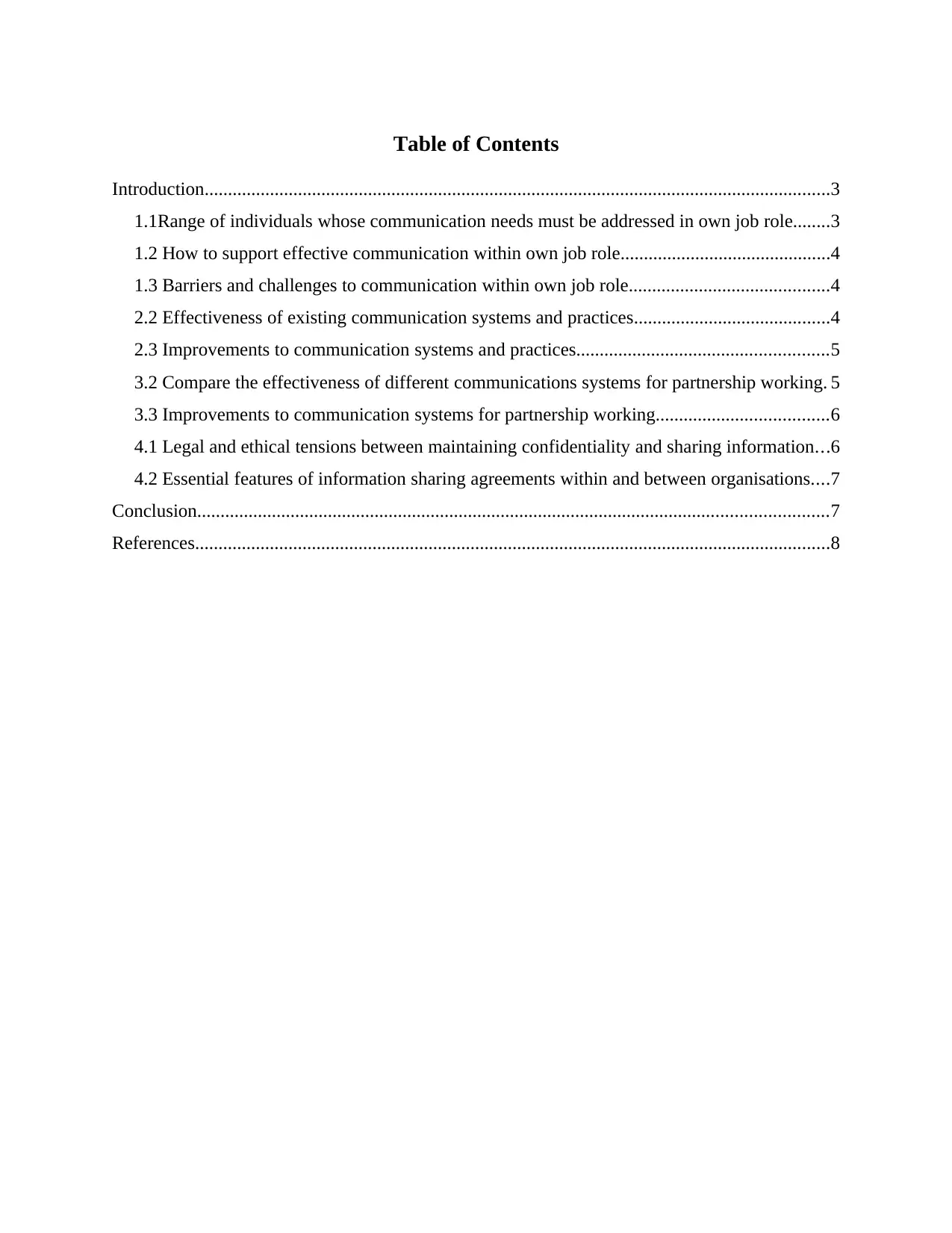
Table of Contents
Introduction......................................................................................................................................3
1.1Range of individuals whose communication needs must be addressed in own job role........3
1.2 How to support effective communication within own job role.............................................4
1.3 Barriers and challenges to communication within own job role...........................................4
2.2 Effectiveness of existing communication systems and practices..........................................4
2.3 Improvements to communication systems and practices......................................................5
3.2 Compare the effectiveness of different communications systems for partnership working. 5
3.3 Improvements to communication systems for partnership working.....................................6
4.1 Legal and ethical tensions between maintaining confidentiality and sharing information...6
4.2 Essential features of information sharing agreements within and between organisations....7
Conclusion.......................................................................................................................................7
References........................................................................................................................................8
Introduction......................................................................................................................................3
1.1Range of individuals whose communication needs must be addressed in own job role........3
1.2 How to support effective communication within own job role.............................................4
1.3 Barriers and challenges to communication within own job role...........................................4
2.2 Effectiveness of existing communication systems and practices..........................................4
2.3 Improvements to communication systems and practices......................................................5
3.2 Compare the effectiveness of different communications systems for partnership working. 5
3.3 Improvements to communication systems for partnership working.....................................6
4.1 Legal and ethical tensions between maintaining confidentiality and sharing information...6
4.2 Essential features of information sharing agreements within and between organisations....7
Conclusion.......................................................................................................................................7
References........................................................................................................................................8
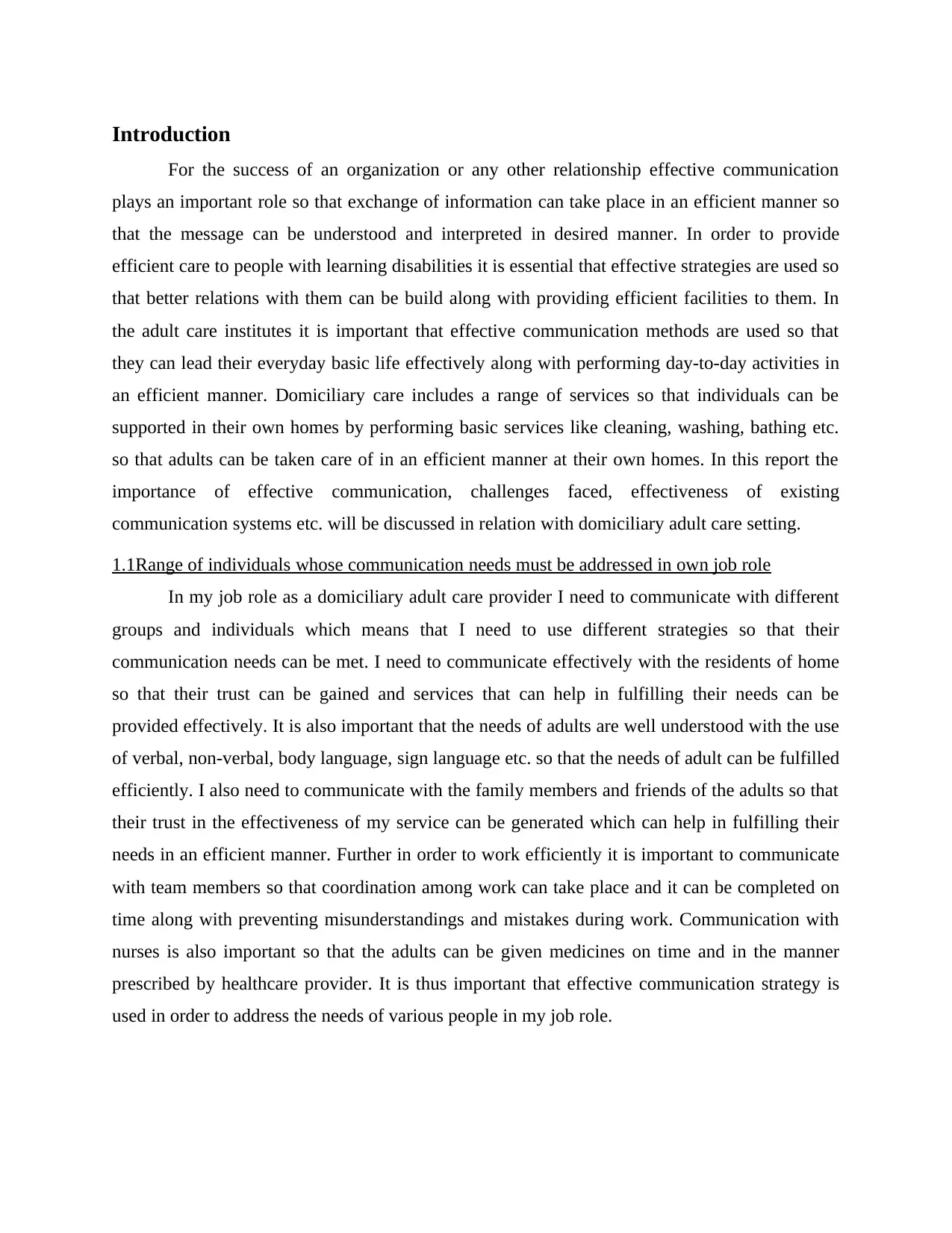
Introduction
For the success of an organization or any other relationship effective communication
plays an important role so that exchange of information can take place in an efficient manner so
that the message can be understood and interpreted in desired manner. In order to provide
efficient care to people with learning disabilities it is essential that effective strategies are used so
that better relations with them can be build along with providing efficient facilities to them. In
the adult care institutes it is important that effective communication methods are used so that
they can lead their everyday basic life effectively along with performing day-to-day activities in
an efficient manner. Domiciliary care includes a range of services so that individuals can be
supported in their own homes by performing basic services like cleaning, washing, bathing etc.
so that adults can be taken care of in an efficient manner at their own homes. In this report the
importance of effective communication, challenges faced, effectiveness of existing
communication systems etc. will be discussed in relation with domiciliary adult care setting.
1.1Range of individuals whose communication needs must be addressed in own job role
In my job role as a domiciliary adult care provider I need to communicate with different
groups and individuals which means that I need to use different strategies so that their
communication needs can be met. I need to communicate effectively with the residents of home
so that their trust can be gained and services that can help in fulfilling their needs can be
provided effectively. It is also important that the needs of adults are well understood with the use
of verbal, non-verbal, body language, sign language etc. so that the needs of adult can be fulfilled
efficiently. I also need to communicate with the family members and friends of the adults so that
their trust in the effectiveness of my service can be generated which can help in fulfilling their
needs in an efficient manner. Further in order to work efficiently it is important to communicate
with team members so that coordination among work can take place and it can be completed on
time along with preventing misunderstandings and mistakes during work. Communication with
nurses is also important so that the adults can be given medicines on time and in the manner
prescribed by healthcare provider. It is thus important that effective communication strategy is
used in order to address the needs of various people in my job role.
For the success of an organization or any other relationship effective communication
plays an important role so that exchange of information can take place in an efficient manner so
that the message can be understood and interpreted in desired manner. In order to provide
efficient care to people with learning disabilities it is essential that effective strategies are used so
that better relations with them can be build along with providing efficient facilities to them. In
the adult care institutes it is important that effective communication methods are used so that
they can lead their everyday basic life effectively along with performing day-to-day activities in
an efficient manner. Domiciliary care includes a range of services so that individuals can be
supported in their own homes by performing basic services like cleaning, washing, bathing etc.
so that adults can be taken care of in an efficient manner at their own homes. In this report the
importance of effective communication, challenges faced, effectiveness of existing
communication systems etc. will be discussed in relation with domiciliary adult care setting.
1.1Range of individuals whose communication needs must be addressed in own job role
In my job role as a domiciliary adult care provider I need to communicate with different
groups and individuals which means that I need to use different strategies so that their
communication needs can be met. I need to communicate effectively with the residents of home
so that their trust can be gained and services that can help in fulfilling their needs can be
provided effectively. It is also important that the needs of adults are well understood with the use
of verbal, non-verbal, body language, sign language etc. so that the needs of adult can be fulfilled
efficiently. I also need to communicate with the family members and friends of the adults so that
their trust in the effectiveness of my service can be generated which can help in fulfilling their
needs in an efficient manner. Further in order to work efficiently it is important to communicate
with team members so that coordination among work can take place and it can be completed on
time along with preventing misunderstandings and mistakes during work. Communication with
nurses is also important so that the adults can be given medicines on time and in the manner
prescribed by healthcare provider. It is thus important that effective communication strategy is
used in order to address the needs of various people in my job role.
⊘ This is a preview!⊘
Do you want full access?
Subscribe today to unlock all pages.

Trusted by 1+ million students worldwide
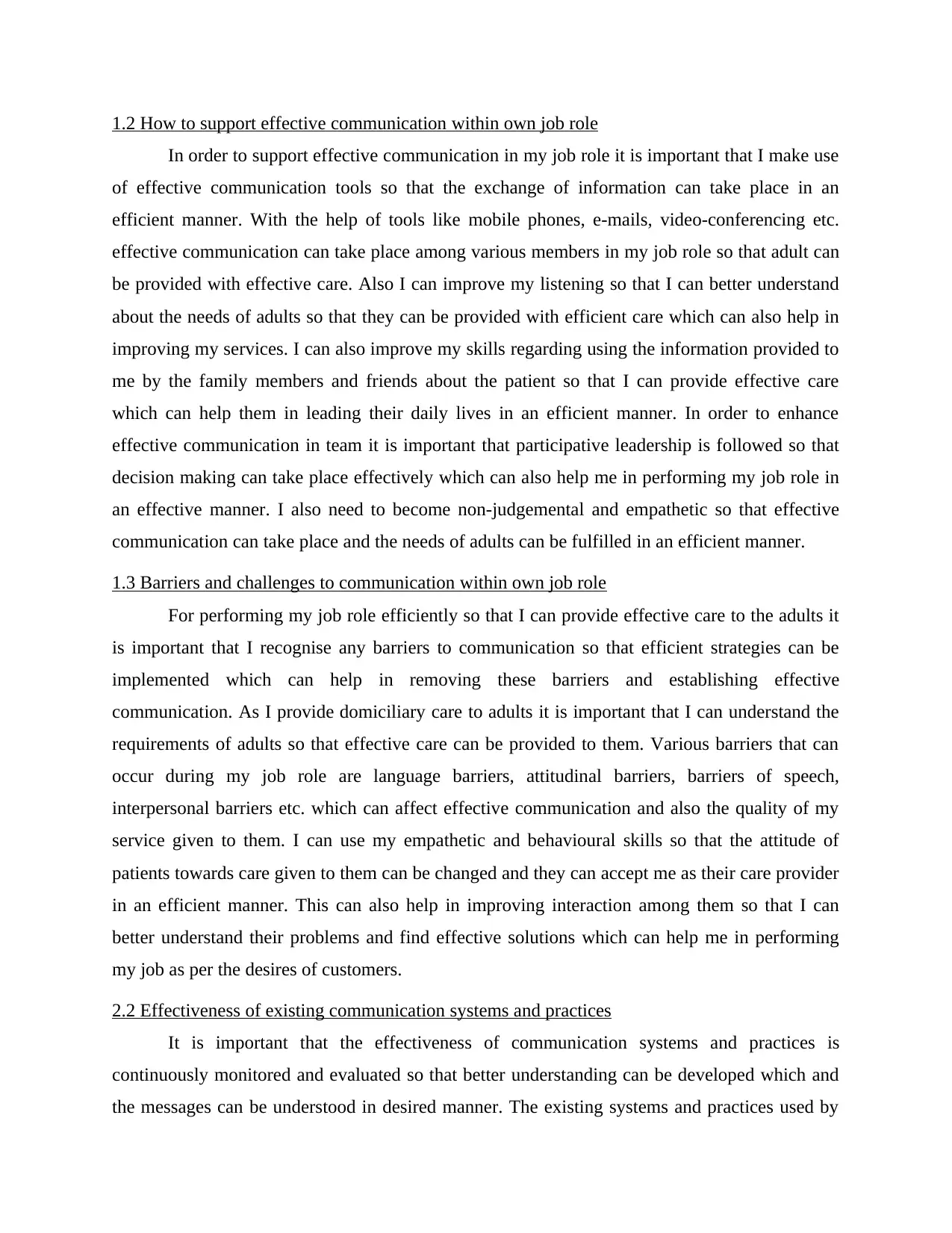
1.2 How to support effective communication within own job role
In order to support effective communication in my job role it is important that I make use
of effective communication tools so that the exchange of information can take place in an
efficient manner. With the help of tools like mobile phones, e-mails, video-conferencing etc.
effective communication can take place among various members in my job role so that adult can
be provided with effective care. Also I can improve my listening so that I can better understand
about the needs of adults so that they can be provided with efficient care which can also help in
improving my services. I can also improve my skills regarding using the information provided to
me by the family members and friends about the patient so that I can provide effective care
which can help them in leading their daily lives in an efficient manner. In order to enhance
effective communication in team it is important that participative leadership is followed so that
decision making can take place effectively which can also help me in performing my job role in
an effective manner. I also need to become non-judgemental and empathetic so that effective
communication can take place and the needs of adults can be fulfilled in an efficient manner.
1.3 Barriers and challenges to communication within own job role
For performing my job role efficiently so that I can provide effective care to the adults it
is important that I recognise any barriers to communication so that efficient strategies can be
implemented which can help in removing these barriers and establishing effective
communication. As I provide domiciliary care to adults it is important that I can understand the
requirements of adults so that effective care can be provided to them. Various barriers that can
occur during my job role are language barriers, attitudinal barriers, barriers of speech,
interpersonal barriers etc. which can affect effective communication and also the quality of my
service given to them. I can use my empathetic and behavioural skills so that the attitude of
patients towards care given to them can be changed and they can accept me as their care provider
in an efficient manner. This can also help in improving interaction among them so that I can
better understand their problems and find effective solutions which can help me in performing
my job as per the desires of customers.
2.2 Effectiveness of existing communication systems and practices
It is important that the effectiveness of communication systems and practices is
continuously monitored and evaluated so that better understanding can be developed which and
the messages can be understood in desired manner. The existing systems and practices used by
In order to support effective communication in my job role it is important that I make use
of effective communication tools so that the exchange of information can take place in an
efficient manner. With the help of tools like mobile phones, e-mails, video-conferencing etc.
effective communication can take place among various members in my job role so that adult can
be provided with effective care. Also I can improve my listening so that I can better understand
about the needs of adults so that they can be provided with efficient care which can also help in
improving my services. I can also improve my skills regarding using the information provided to
me by the family members and friends about the patient so that I can provide effective care
which can help them in leading their daily lives in an efficient manner. In order to enhance
effective communication in team it is important that participative leadership is followed so that
decision making can take place effectively which can also help me in performing my job role in
an effective manner. I also need to become non-judgemental and empathetic so that effective
communication can take place and the needs of adults can be fulfilled in an efficient manner.
1.3 Barriers and challenges to communication within own job role
For performing my job role efficiently so that I can provide effective care to the adults it
is important that I recognise any barriers to communication so that efficient strategies can be
implemented which can help in removing these barriers and establishing effective
communication. As I provide domiciliary care to adults it is important that I can understand the
requirements of adults so that effective care can be provided to them. Various barriers that can
occur during my job role are language barriers, attitudinal barriers, barriers of speech,
interpersonal barriers etc. which can affect effective communication and also the quality of my
service given to them. I can use my empathetic and behavioural skills so that the attitude of
patients towards care given to them can be changed and they can accept me as their care provider
in an efficient manner. This can also help in improving interaction among them so that I can
better understand their problems and find effective solutions which can help me in performing
my job as per the desires of customers.
2.2 Effectiveness of existing communication systems and practices
It is important that the effectiveness of communication systems and practices is
continuously monitored and evaluated so that better understanding can be developed which and
the messages can be understood in desired manner. The existing systems and practices used by
Paraphrase This Document
Need a fresh take? Get an instant paraphrase of this document with our AI Paraphraser
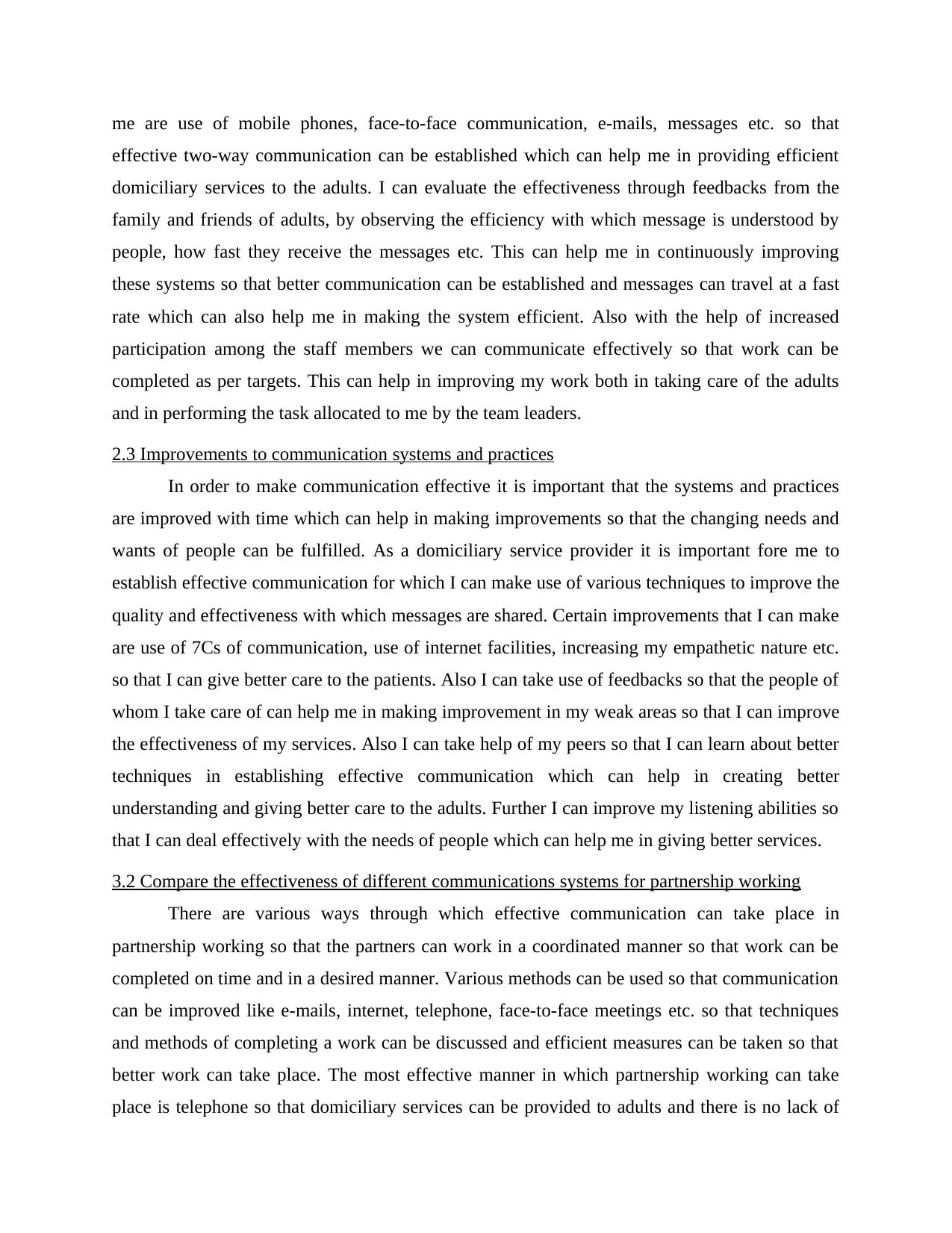
me are use of mobile phones, face-to-face communication, e-mails, messages etc. so that
effective two-way communication can be established which can help me in providing efficient
domiciliary services to the adults. I can evaluate the effectiveness through feedbacks from the
family and friends of adults, by observing the efficiency with which message is understood by
people, how fast they receive the messages etc. This can help me in continuously improving
these systems so that better communication can be established and messages can travel at a fast
rate which can also help me in making the system efficient. Also with the help of increased
participation among the staff members we can communicate effectively so that work can be
completed as per targets. This can help in improving my work both in taking care of the adults
and in performing the task allocated to me by the team leaders.
2.3 Improvements to communication systems and practices
In order to make communication effective it is important that the systems and practices
are improved with time which can help in making improvements so that the changing needs and
wants of people can be fulfilled. As a domiciliary service provider it is important fore me to
establish effective communication for which I can make use of various techniques to improve the
quality and effectiveness with which messages are shared. Certain improvements that I can make
are use of 7Cs of communication, use of internet facilities, increasing my empathetic nature etc.
so that I can give better care to the patients. Also I can take use of feedbacks so that the people of
whom I take care of can help me in making improvement in my weak areas so that I can improve
the effectiveness of my services. Also I can take help of my peers so that I can learn about better
techniques in establishing effective communication which can help in creating better
understanding and giving better care to the adults. Further I can improve my listening abilities so
that I can deal effectively with the needs of people which can help me in giving better services.
3.2 Compare the effectiveness of different communications systems for partnership working
There are various ways through which effective communication can take place in
partnership working so that the partners can work in a coordinated manner so that work can be
completed on time and in a desired manner. Various methods can be used so that communication
can be improved like e-mails, internet, telephone, face-to-face meetings etc. so that techniques
and methods of completing a work can be discussed and efficient measures can be taken so that
better work can take place. The most effective manner in which partnership working can take
place is telephone so that domiciliary services can be provided to adults and there is no lack of
effective two-way communication can be established which can help me in providing efficient
domiciliary services to the adults. I can evaluate the effectiveness through feedbacks from the
family and friends of adults, by observing the efficiency with which message is understood by
people, how fast they receive the messages etc. This can help me in continuously improving
these systems so that better communication can be established and messages can travel at a fast
rate which can also help me in making the system efficient. Also with the help of increased
participation among the staff members we can communicate effectively so that work can be
completed as per targets. This can help in improving my work both in taking care of the adults
and in performing the task allocated to me by the team leaders.
2.3 Improvements to communication systems and practices
In order to make communication effective it is important that the systems and practices
are improved with time which can help in making improvements so that the changing needs and
wants of people can be fulfilled. As a domiciliary service provider it is important fore me to
establish effective communication for which I can make use of various techniques to improve the
quality and effectiveness with which messages are shared. Certain improvements that I can make
are use of 7Cs of communication, use of internet facilities, increasing my empathetic nature etc.
so that I can give better care to the patients. Also I can take use of feedbacks so that the people of
whom I take care of can help me in making improvement in my weak areas so that I can improve
the effectiveness of my services. Also I can take help of my peers so that I can learn about better
techniques in establishing effective communication which can help in creating better
understanding and giving better care to the adults. Further I can improve my listening abilities so
that I can deal effectively with the needs of people which can help me in giving better services.
3.2 Compare the effectiveness of different communications systems for partnership working
There are various ways through which effective communication can take place in
partnership working so that the partners can work in a coordinated manner so that work can be
completed on time and in a desired manner. Various methods can be used so that communication
can be improved like e-mails, internet, telephone, face-to-face meetings etc. so that techniques
and methods of completing a work can be discussed and efficient measures can be taken so that
better work can take place. The most effective manner in which partnership working can take
place is telephone so that domiciliary services can be provided to adults and there is no lack of
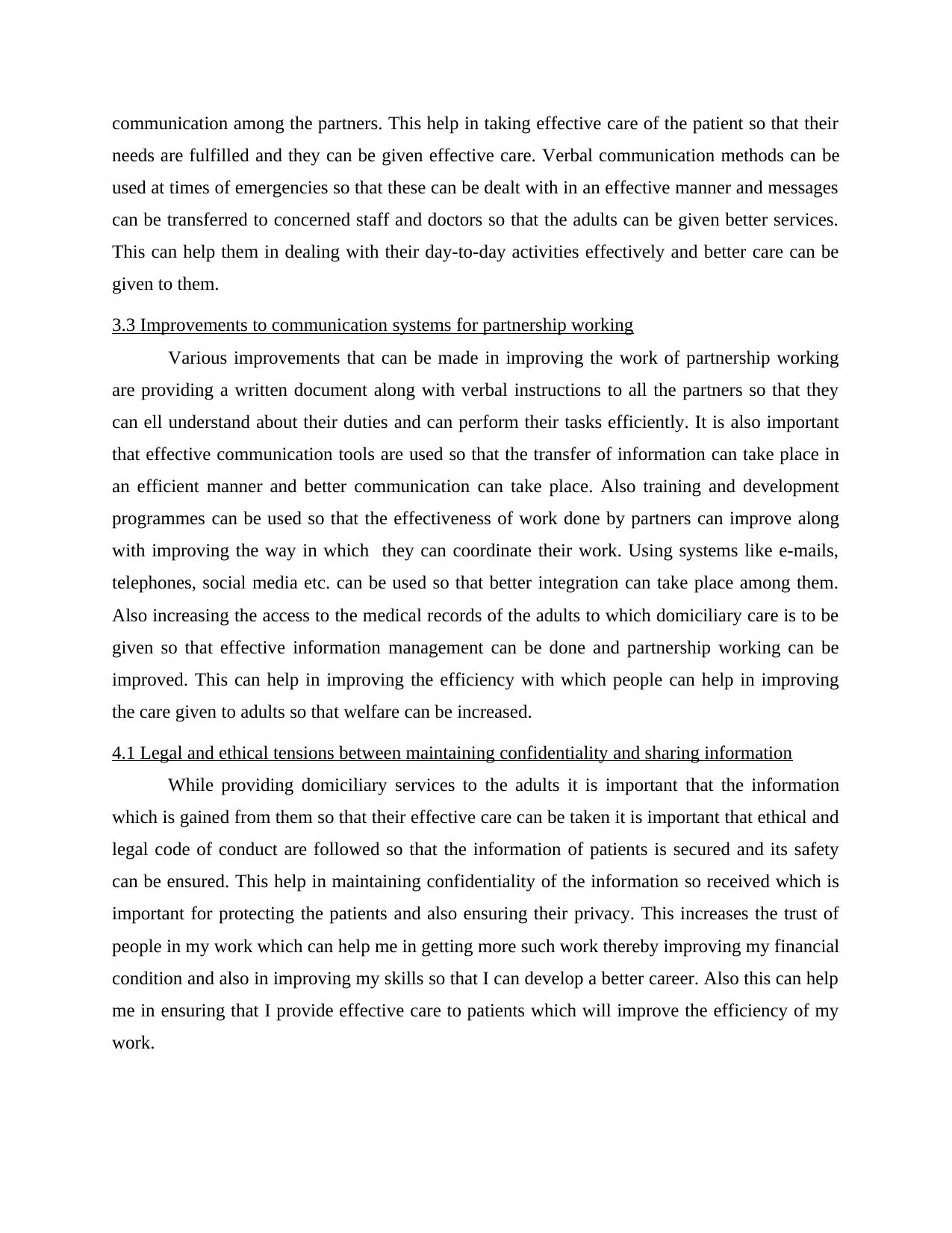
communication among the partners. This help in taking effective care of the patient so that their
needs are fulfilled and they can be given effective care. Verbal communication methods can be
used at times of emergencies so that these can be dealt with in an effective manner and messages
can be transferred to concerned staff and doctors so that the adults can be given better services.
This can help them in dealing with their day-to-day activities effectively and better care can be
given to them.
3.3 Improvements to communication systems for partnership working
Various improvements that can be made in improving the work of partnership working
are providing a written document along with verbal instructions to all the partners so that they
can ell understand about their duties and can perform their tasks efficiently. It is also important
that effective communication tools are used so that the transfer of information can take place in
an efficient manner and better communication can take place. Also training and development
programmes can be used so that the effectiveness of work done by partners can improve along
with improving the way in which they can coordinate their work. Using systems like e-mails,
telephones, social media etc. can be used so that better integration can take place among them.
Also increasing the access to the medical records of the adults to which domiciliary care is to be
given so that effective information management can be done and partnership working can be
improved. This can help in improving the efficiency with which people can help in improving
the care given to adults so that welfare can be increased.
4.1 Legal and ethical tensions between maintaining confidentiality and sharing information
While providing domiciliary services to the adults it is important that the information
which is gained from them so that their effective care can be taken it is important that ethical and
legal code of conduct are followed so that the information of patients is secured and its safety
can be ensured. This help in maintaining confidentiality of the information so received which is
important for protecting the patients and also ensuring their privacy. This increases the trust of
people in my work which can help me in getting more such work thereby improving my financial
condition and also in improving my skills so that I can develop a better career. Also this can help
me in ensuring that I provide effective care to patients which will improve the efficiency of my
work.
needs are fulfilled and they can be given effective care. Verbal communication methods can be
used at times of emergencies so that these can be dealt with in an effective manner and messages
can be transferred to concerned staff and doctors so that the adults can be given better services.
This can help them in dealing with their day-to-day activities effectively and better care can be
given to them.
3.3 Improvements to communication systems for partnership working
Various improvements that can be made in improving the work of partnership working
are providing a written document along with verbal instructions to all the partners so that they
can ell understand about their duties and can perform their tasks efficiently. It is also important
that effective communication tools are used so that the transfer of information can take place in
an efficient manner and better communication can take place. Also training and development
programmes can be used so that the effectiveness of work done by partners can improve along
with improving the way in which they can coordinate their work. Using systems like e-mails,
telephones, social media etc. can be used so that better integration can take place among them.
Also increasing the access to the medical records of the adults to which domiciliary care is to be
given so that effective information management can be done and partnership working can be
improved. This can help in improving the efficiency with which people can help in improving
the care given to adults so that welfare can be increased.
4.1 Legal and ethical tensions between maintaining confidentiality and sharing information
While providing domiciliary services to the adults it is important that the information
which is gained from them so that their effective care can be taken it is important that ethical and
legal code of conduct are followed so that the information of patients is secured and its safety
can be ensured. This help in maintaining confidentiality of the information so received which is
important for protecting the patients and also ensuring their privacy. This increases the trust of
people in my work which can help me in getting more such work thereby improving my financial
condition and also in improving my skills so that I can develop a better career. Also this can help
me in ensuring that I provide effective care to patients which will improve the efficiency of my
work.
⊘ This is a preview!⊘
Do you want full access?
Subscribe today to unlock all pages.

Trusted by 1+ million students worldwide
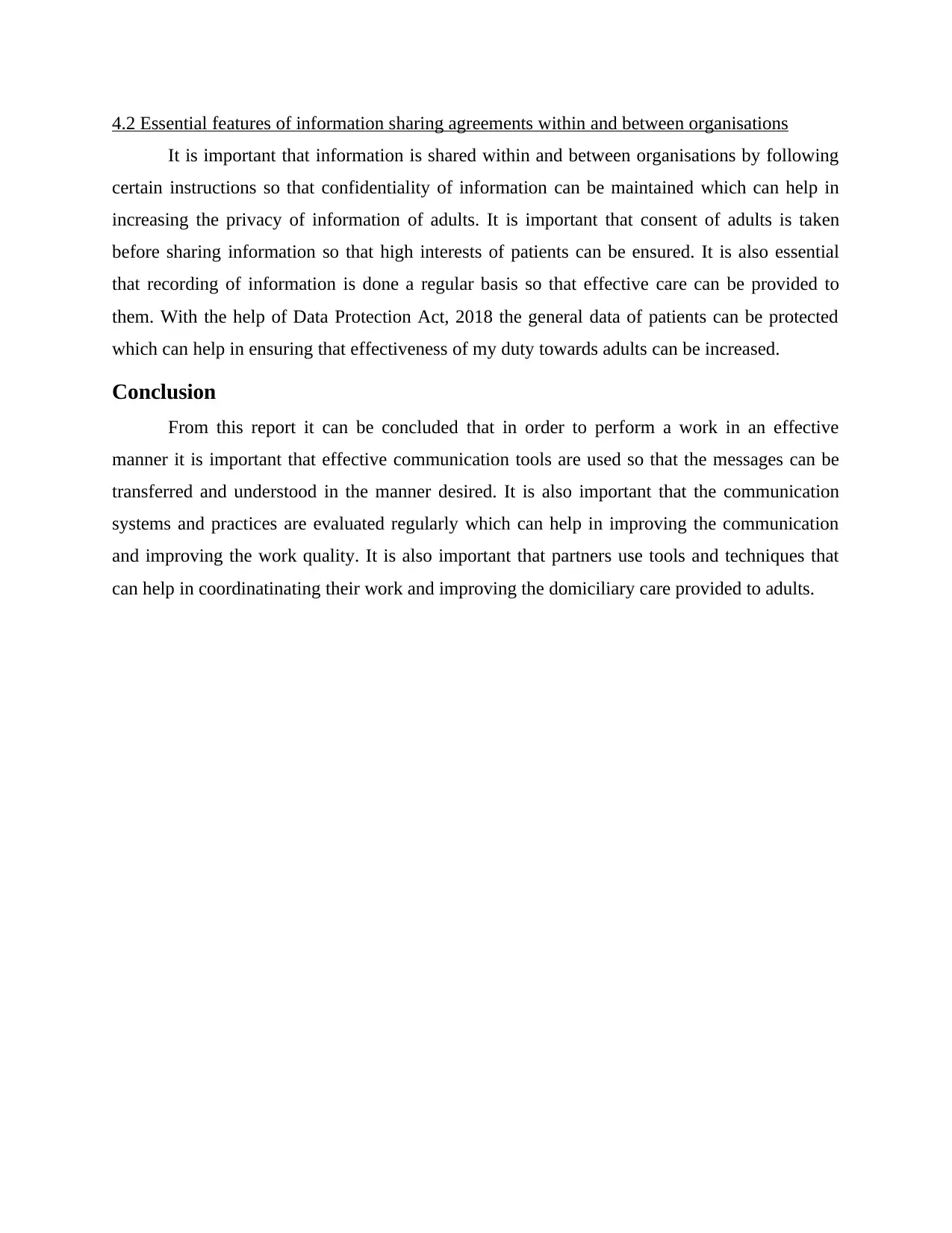
4.2 Essential features of information sharing agreements within and between organisations
It is important that information is shared within and between organisations by following
certain instructions so that confidentiality of information can be maintained which can help in
increasing the privacy of information of adults. It is important that consent of adults is taken
before sharing information so that high interests of patients can be ensured. It is also essential
that recording of information is done a regular basis so that effective care can be provided to
them. With the help of Data Protection Act, 2018 the general data of patients can be protected
which can help in ensuring that effectiveness of my duty towards adults can be increased.
Conclusion
From this report it can be concluded that in order to perform a work in an effective
manner it is important that effective communication tools are used so that the messages can be
transferred and understood in the manner desired. It is also important that the communication
systems and practices are evaluated regularly which can help in improving the communication
and improving the work quality. It is also important that partners use tools and techniques that
can help in coordinatinating their work and improving the domiciliary care provided to adults.
It is important that information is shared within and between organisations by following
certain instructions so that confidentiality of information can be maintained which can help in
increasing the privacy of information of adults. It is important that consent of adults is taken
before sharing information so that high interests of patients can be ensured. It is also essential
that recording of information is done a regular basis so that effective care can be provided to
them. With the help of Data Protection Act, 2018 the general data of patients can be protected
which can help in ensuring that effectiveness of my duty towards adults can be increased.
Conclusion
From this report it can be concluded that in order to perform a work in an effective
manner it is important that effective communication tools are used so that the messages can be
transferred and understood in the manner desired. It is also important that the communication
systems and practices are evaluated regularly which can help in improving the communication
and improving the work quality. It is also important that partners use tools and techniques that
can help in coordinatinating their work and improving the domiciliary care provided to adults.
Paraphrase This Document
Need a fresh take? Get an instant paraphrase of this document with our AI Paraphraser
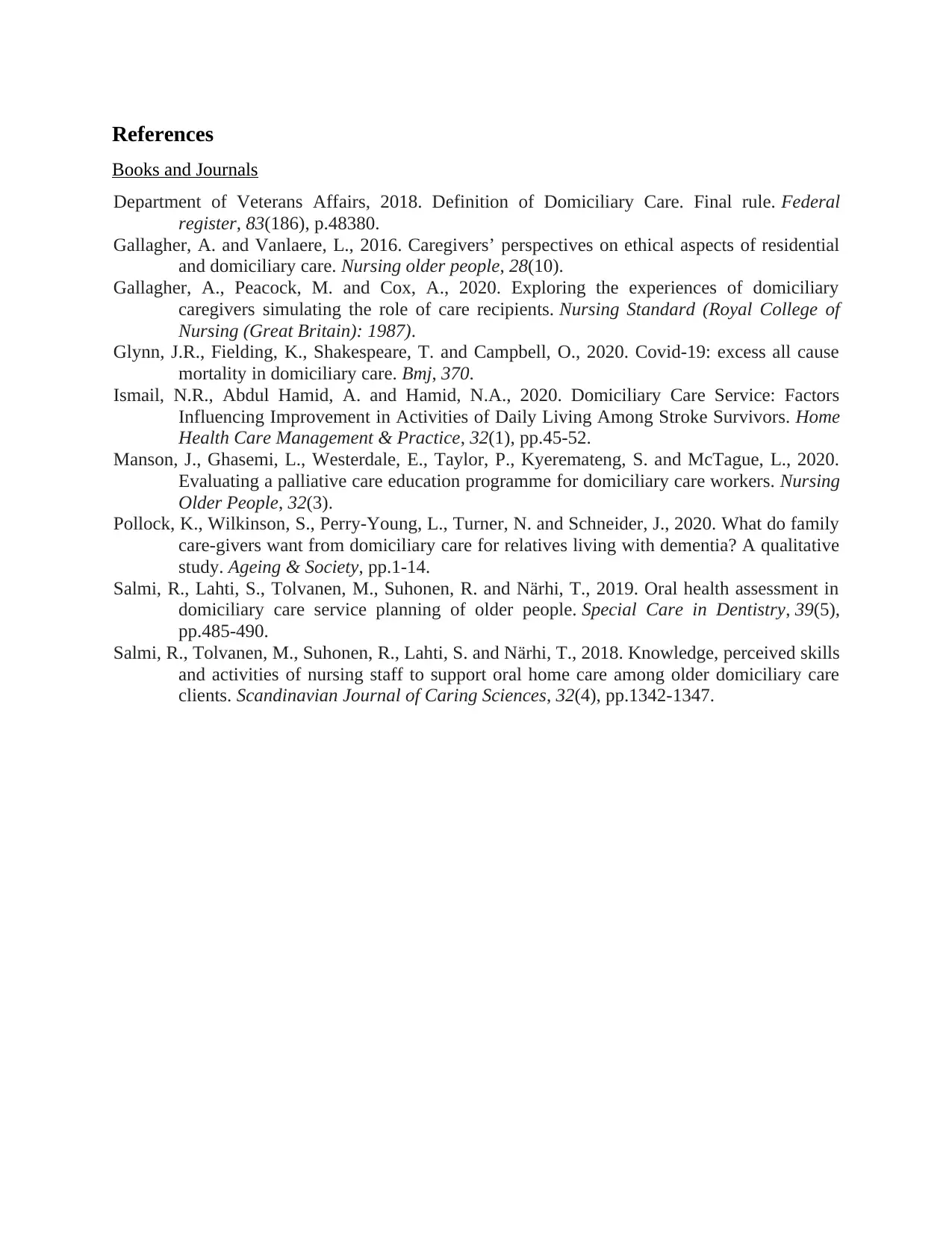
References
Books and Journals
Department of Veterans Affairs, 2018. Definition of Domiciliary Care. Final rule. Federal
register, 83(186), p.48380.
Gallagher, A. and Vanlaere, L., 2016. Caregivers’ perspectives on ethical aspects of residential
and domiciliary care. Nursing older people, 28(10).
Gallagher, A., Peacock, M. and Cox, A., 2020. Exploring the experiences of domiciliary
caregivers simulating the role of care recipients. Nursing Standard (Royal College of
Nursing (Great Britain): 1987).
Glynn, J.R., Fielding, K., Shakespeare, T. and Campbell, O., 2020. Covid-19: excess all cause
mortality in domiciliary care. Bmj, 370.
Ismail, N.R., Abdul Hamid, A. and Hamid, N.A., 2020. Domiciliary Care Service: Factors
Influencing Improvement in Activities of Daily Living Among Stroke Survivors. Home
Health Care Management & Practice, 32(1), pp.45-52.
Manson, J., Ghasemi, L., Westerdale, E., Taylor, P., Kyeremateng, S. and McTague, L., 2020.
Evaluating a palliative care education programme for domiciliary care workers. Nursing
Older People, 32(3).
Pollock, K., Wilkinson, S., Perry-Young, L., Turner, N. and Schneider, J., 2020. What do family
care-givers want from domiciliary care for relatives living with dementia? A qualitative
study. Ageing & Society, pp.1-14.
Salmi, R., Lahti, S., Tolvanen, M., Suhonen, R. and Närhi, T., 2019. Oral health assessment in
domiciliary care service planning of older people. Special Care in Dentistry, 39(5),
pp.485-490.
Salmi, R., Tolvanen, M., Suhonen, R., Lahti, S. and Närhi, T., 2018. Knowledge, perceived skills
and activities of nursing staff to support oral home care among older domiciliary care
clients. Scandinavian Journal of Caring Sciences, 32(4), pp.1342-1347.
Books and Journals
Department of Veterans Affairs, 2018. Definition of Domiciliary Care. Final rule. Federal
register, 83(186), p.48380.
Gallagher, A. and Vanlaere, L., 2016. Caregivers’ perspectives on ethical aspects of residential
and domiciliary care. Nursing older people, 28(10).
Gallagher, A., Peacock, M. and Cox, A., 2020. Exploring the experiences of domiciliary
caregivers simulating the role of care recipients. Nursing Standard (Royal College of
Nursing (Great Britain): 1987).
Glynn, J.R., Fielding, K., Shakespeare, T. and Campbell, O., 2020. Covid-19: excess all cause
mortality in domiciliary care. Bmj, 370.
Ismail, N.R., Abdul Hamid, A. and Hamid, N.A., 2020. Domiciliary Care Service: Factors
Influencing Improvement in Activities of Daily Living Among Stroke Survivors. Home
Health Care Management & Practice, 32(1), pp.45-52.
Manson, J., Ghasemi, L., Westerdale, E., Taylor, P., Kyeremateng, S. and McTague, L., 2020.
Evaluating a palliative care education programme for domiciliary care workers. Nursing
Older People, 32(3).
Pollock, K., Wilkinson, S., Perry-Young, L., Turner, N. and Schneider, J., 2020. What do family
care-givers want from domiciliary care for relatives living with dementia? A qualitative
study. Ageing & Society, pp.1-14.
Salmi, R., Lahti, S., Tolvanen, M., Suhonen, R. and Närhi, T., 2019. Oral health assessment in
domiciliary care service planning of older people. Special Care in Dentistry, 39(5),
pp.485-490.
Salmi, R., Tolvanen, M., Suhonen, R., Lahti, S. and Närhi, T., 2018. Knowledge, perceived skills
and activities of nursing staff to support oral home care among older domiciliary care
clients. Scandinavian Journal of Caring Sciences, 32(4), pp.1342-1347.
1 out of 8
Related Documents
Your All-in-One AI-Powered Toolkit for Academic Success.
+13062052269
info@desklib.com
Available 24*7 on WhatsApp / Email
![[object Object]](/_next/static/media/star-bottom.7253800d.svg)
Unlock your academic potential
Copyright © 2020–2025 A2Z Services. All Rights Reserved. Developed and managed by ZUCOL.





